Known for its strength in maritime law, and in spite of the disruptions and challenges posed by the COVID-19 outbreak, Miami Law’s Maritime Moot Team—made up of rising 3L Natalie Whitacre and recent Maritime Law LL.M. grads Anna Lena-Simon and Maria Belen Villavicencio—earned one of the top 10 highest scores in the 21st annual International Maritime Law Arbitration Moot. The IMLAM involves a dispute relating to commercial maritime law and the controversy is determined before an arbitral tribunal.
The Miami Law team participated as part of the International Moot Court Program headed by Director Paula Arias. Miami Law’s International Moot Court Program is the only one of its kind in the United States that prepares students for competitions all over the world. In addition to maritime commercial law, it covers legal fields such as international criminal law, human rights, taxation, and more.
In their announcement of the results, the International Maritime Law Arbitration moot organizers gave special recognition to UM for performing so well in only their second year participating in the competition. The team was the only U.S. law school to participate and was also commended for pressing forward with the IMLA Moot despite the pandemic, which had led to the cancellation of the final oral rounds that had been scheduled to occur in Singapore. Participants were instead judged fully on the strength of their written memorials, from organization to the creativity of the arguments.
“The moot court problem was extremely challenging,” notes Whitacre, who is pursuing an LL.M. in International Arbitration. "But the experience of researching and developing an argument from the very beginning was invaluable. I developed so many skills that will carry forward with me into my career.”
The IMLA Moot is one of the most prestigious competitions centered around maritime law. Each year it presents students from around the world with a hypothetical commercial maritime dispute that will be decided by an arbitral tribunal. Teams must sift through a complex fact pattern and delve into the intricacies of maritime commercial law, which is a rapidly developing field in the globalized economy. Firms across the maritime industry, from shipping to legal services, take an interest in the competition since it typically deals with complicated or novel issues in the field. Real attorneys, jurists, and arbitrators judge the memorials.
“It was a pleasure working with such a dedicated group of students who went outside of their comfort zones to learn about maritime law and arbitration,” said Eftihios Andronis J.D., ’14, who helped coach the team alongside LL.M. candidate Nadia Zorba, and Arias. “Maritime law is an exciting area of the law that is steeped in history. Despite everything that is going on in the world right now, the team was able to persevere and succeed. I am happy to see UM continue to show the world Miami has a place in the larger maritime community. I look forward to continuing to help with this competition.” Both Andronis and Zorba have experience handling cases involving maritime law.
Undeterred by the pandemic, the Miami Law team often worked around the clock to ensure their written briefs were exemplary, even spending most of Memorial Day weekend polishing them up before the deadline. Along the way, they learned many skills that are vital for legal practitioners in any field.
“Participating in the Moot Court program was challenging and beneficial at the same time. It was a lot of work and the fact pattern was a lot but once I fully understood it, I really enjoyed developing my arguments for both sides,” said Lena-Simon, an international student from Germany. “I had never written a brief before, so I learned a lot. I also learned how to express my arguments more clearly and precisely. It can be challenging to work in a team where people think and work in a different way.”
More on the International Moot Court Program
More on studying Maritime Law
More on the LL.M. in International Arbitration

